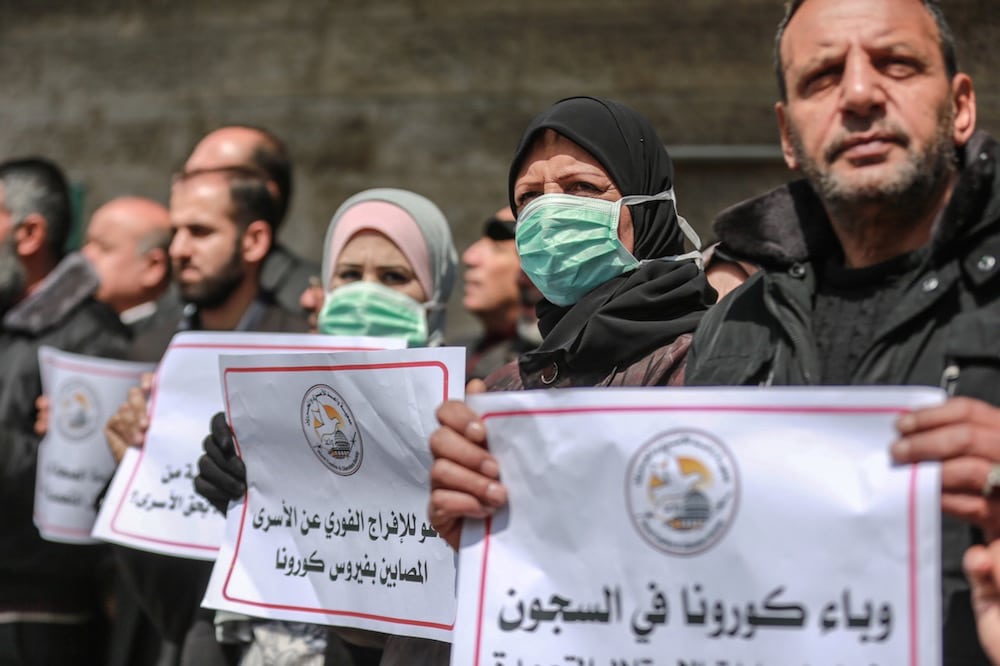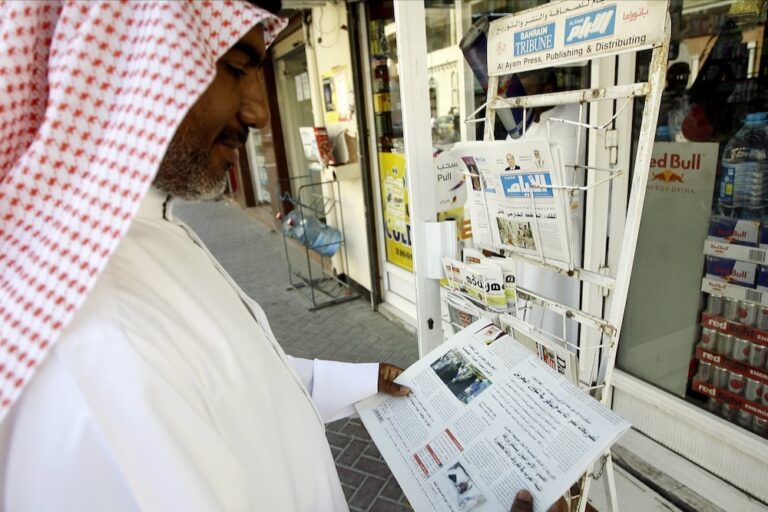March in Middle East and North Africa: A free expression roundup, based on member reports and news from the region.
The Prisoners’ Dilemma
With the COVID-19 pandemic raging in the region, rights groups have swiftly turned their attention to the plight of thousands of prisoners stuck in cramped, unsanitary jail cells. The Cairo Institute for Human Rights Studies (CIHRS) and rights groups in Egypt launched a petition calling on authorities to release all non-violent prisoners to avoid turning overcrowded prisons into epicenters of the pandemic. Rights groups have also called for the release of at least 1,000 doctors and nurses stuck behind bars during the worst health crisis in recent history.
Last month, Egyptian blogger Alaa Abdel Fattah’s mother, Lila Soueif, along with his sister Mona Seif and aunt, prominent writer Ahdaf Soueif, were arrested with other female activists after staging a protest outside an Egyptian cabinet building to call for prisoner releases.
The Gulf Center for Human Rights (GCHR) highlighted the plight of prisoners of conscience across the region who face some of the worst conditions imaginable in the face of the deadly virus. These include human rights defenders Nabeel Rajab and Mohamed Al-Khawaja in Bahrain, as well as Ahmed Mansoor in the UAE, whose health has suffered due to continued hunger strikes.
“While the World Health Organisation continuously stresses social distancing, quarantine and hygiene above all, human rights defenders in prisons across the Middle East don’t have the privilege to access proper hygiene or showers, and many are kept in overcrowded prisons,” explained Khalid Ibrahim, GCHR’s Executive Director, calling the inability of governments in the region to prevent the virus’s spread in prisons compelling justification to free all prisoners of conscience.
In Saudi Arabia, women’s rights activists Loujain Hathloul and Mayaa Al-Zahrani also remain in jail, with their 18 March trial postponed indefinitely due to the outbreak. In a twisted sense of irony, calls for prisoner releases in the Kingdom have been met with a new wave of arrests, which include Snapchat celebrity Mansour Al-Raqiba. Prominent Saudi preacher Saleh Al Mughamsi was relieved of his duties as the Imam of the Quba mosque in Medina after tweeting that the release of those held for minor offences was religiously sanctioned.
While recent weeks have seen thousands of prisoners released in Bahrain, Tunisia, and Iran, where political prisoners have also staged hunger strikes, riots, and escapes, countless more linger in detention.
This is literally true in Syria, where the total number of detainees remains largely unknown. The government’s early denials of having any COVID-19 cases have fueled fears of a potential catastrophic outbreak unfolding in the conflict-ridden country. Calling for the release of prisoners in a joint statement spearheaded by the Syrian Center for Media and Freedom of Expression (SCM), rights groups expressed deep concern over the government’s continued refusal to release health records of detainees, especially those who are in need of specialized health care.
Censorship, Access to Information, and Conspiracies
Throughout the region, censorship has critically undermined the free flow of news and information crucial to citizens’ safety, while fake news has spread faster than the actual virus. From Morocco to Iraq, a lethal combination of state suppression of news and an abundance of misinformation have sowed fear and panic in a region where government transparency and reliable information is already in short supply. As journalists in MENA continuously question official narratives and figures produced by their governments, their work has been consistently impeded by authorities.
In Iran, one of the hardest hit countries, the government has doubled down on its instincts to censor bad news. According to the Committee to Protect Journalists (CPJ), the Iranian government began covering up the rapid spread of the virus in February, wanting to avoid a low turnout for the 21 February parliamentary elections and taking no precautions to safeguard voters’ health, resulting in the death of at least two incoming lawmakers. Iranian authorities have spent the past several weeks threatening journalists, fueling conspiracy theories of biological warfare, and accusing western media of producing ‘fake news’ in their reporting on the country’s health crisis, much of which is being generated by Iranian journalists in exile.
Websites providing critical information for citizens have been actively blocked, including Wikipedia Farsi, while a decree banning the printing of newspapers was also issued. Jordan, Oman, Morocco, and Yemen have issued similar edicts in recent weeks, despite insufficient evidence to suggest that the virus transmission can occur through printed materials.
Egypt has moved to monopolize information about the pandemic, with a clampdown that included blocking news websites it accused of “spreading fake news”, and expelling two journalists from The Guardian for questioning the government’s official tally of virus cases.
Misinformation designed to capitalize on the current pandemic to serve ongoing political and sectarian tensions in the region has also emerged. This includes a Saudi-backed #Qatar_is_Corona hashtag, which disseminated a conspiracy that the virus outbreak is being leveraged by the Qatari government in an effort to undermine the Riyadh Vision 2030 and the UAE’s Expo 2020.
According to Reporters Without Borders, authorities are already making “extensive use of existing control mechanisms”. Current cybercrime laws, whose notoriously vague legal language has been wielded by states throughout the region as a means of suppressing online freedom of expression, will undoubtedly play a growing role in the weeks to come.
Enter the fact-checkers:
In Palestine, MADA Center launched an online campaign to combat misinformation about coronavirus circulating on Palestinian social networks, producing an ongoing series of videos and social posts. “We’ve seen mass misinformation spread around symptoms and cures of coronavirus,” said MADA director Mousa Rimawi in a recent interview. “This is very dangerous because those doing so are putting other lives at risk, often without even knowing it because the rumours have gone viral… Our aim is to direct everyone to the right sources.”
Journalists at the media monitoring initiative Kashif have also been active in the fight to contain misinformation on the virus by fact-checking content circulating in Palestinian media. From verifying the number of cases to checking news being translated from Israeli media, their daily reports have been adopted by the Palestinian Journalists Syndicate as a verification tool to follow up with media outlets publishing misleading information.
New and noteworthy
In Egypt:
Prominent human rights defender and CIHRS director, Bahey eldin Hassan received a three-year sentence and a fine of 20,000 Egyptian pounds ($1,269) for a 2018 tweet in which he criticized the country’s public prosecution. According to CIHRS, the sentencing was a demonstration of how the judiciary’s independence has eroded under President Abdel Fattah al-Sisi, and “yet another manifestation of the Egyptian government’s deep-seated vindictiveness against rights defenders.”
Egypt’s ongoing clampdown on prominent activists also saw human rights lawyer and former member of parliament Zyad Elelaimy receiving a one-year sentence last month for “insulting the president” in a 2017 BBC television interview he gave. Already detained since June 2019 for another case, the recent sentencing is yet another demonstration of how the unlawful practice of recycling cases – whereby new cases are fabricated against currently or previously detained activists in order to keep them behind bars – continues to play out in the country.
Authorities also arrested two brothers of popular YouTube vlogger Abdullah Sharif, after he broadcast a video allegedly showing a special forces officer in the Egyptian army attacking and mutilating a civilian in the Sinai region. The footage has garnered millions of views, and activist Nermine Hussein was also detained for sharing the viral video on Twitter and naming the officer.
The kids are not alright
A new report from Human Rights Watch documented the abuse of 20 children between the ages of 12 and 17 at the hands of Egyptian security forces. Many of these minors were forcibly disappeared for participating and documenting protests, or expressing political opinions online. Of the 4,400 protesters detained during September 2019 protests, an estimated 180 were children, with those chronicled in the report describing being waterboarded and electrocuted.
In the Maghreb region:
Moroccan Journalist Omar Radi was given a four month suspended sentence for his online criticism of a judge, while in Algeria, RSF correspondent Khaled Drareni was arrested and sentenced to prison for his coverage of the country’s anti-government ‘hirak’ protests. He is currently released under court supervision and banned from traveling.
In Palestine:
With social distancing impacting countless events in the region, IFEX member 7amleh managed to adapt its first Palestine Digital Activism Forum into an online event. Thousands tuned into the virtual sessions where participants from the region discussed combating fake news produced by the pandemic, as well as violations of Palestinian digital rights at the hands of Israel, the Palestinian Authority, and social media companies.
Press Freedom’s Worst Digital Predators in MENA
To mark the International Day Against Cyber Censorship on 12 March, RSF published its list of press freedom’s 20 worst digital predators in 2020, featuring companies and government agencies in the MENA region employing digital technology for surveillance and harassment of journalists. The list includes the likes of Algeria’s pro-regime army of trolls dubbed the ‘electronic flies’, Saudi Arabia’s ‘electronic brigade’, and Egypt’s Supreme Council for Media Regulation, which has blocked hundreds of websites in the country.



